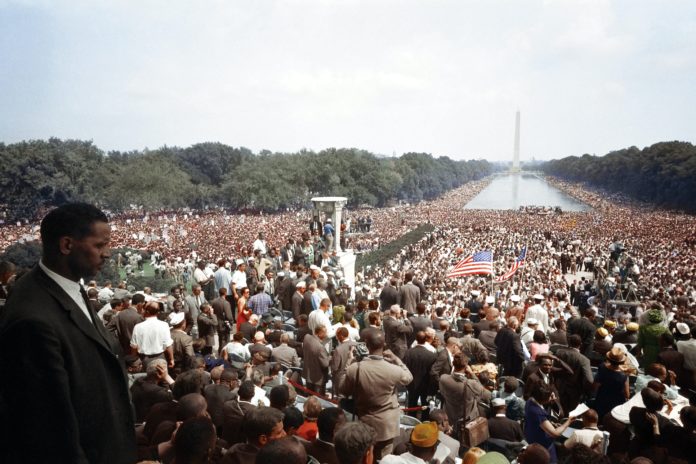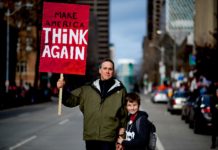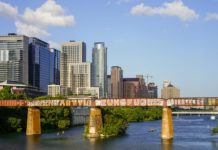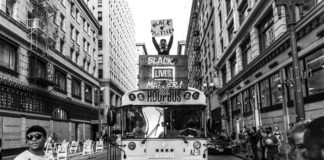
Photo: Warren K. Leffler, colorized by Jordan J. Lloyd. Library of Congress, via Unsplash
The 57th anniversary of the March on Washington, the most heralded civil rights demonstration in American history, takes place against the backdrop of police and white vigilante violence against Black people.
The police shooting of Jacob Blake, an unarmed Black man in Kenosha, Wisconsin on Sunday, August 23 has catalyzed nationwide protests calling for the reimagining of public safety in America. Blake, who was shot in front of his children, survived the shooting but remains paralyzed from the waist down. Two nights after his shooting unarmed protesters were ambushed by a 17-year-old shooter who murdered two protesters and wounded a third. In response to this dizzying series of events the Milwaukee Bucks NBA team boycotted their playoff game, a decision that has culminated with players in the overwhelmingly Black sports league contemplating ending the season in protest against the cascading waves of racial injustice that have set America on fire since the May 25 police murder of George Floyd.
So on the eve of the commemoration of Dr. Martin Luther King Jr.’s historic “I Have a Dream” speech, which called America toward a moral and political reckoning necessary to defeat systemic racism, end white supremacy, and redistribute power, wealth, and justice, we have Black athletes and citizens from all backgrounds organizing protests in an effort to reimagine American democracy.
The March on Washington for Jobs and Freedom inspired 250,000 people, including an estimated 90,000 White Americas, to the nation’s capital in support of Black citizenship and dignity. John Lewis, as chairman of the Student Non-Violent Coordinating Committee (SNCC), delivered a combative speech, publicly recognizing the growing impatience and restlessness of the Black masses and vowing to remake the South in the “image of God and democracy.”
King began his most famous address by uttering the words, “Now is the time to make real the promise of democracy.” The massive demonstration turned the nation, for one day, into a mass church movement meeting. The stakes in 1963 were high, with thousands of pro-civil rights demonstrations gripping the nation from coast to coast. King’s “Letter from Birmingham Jail” earlier that spring excoriated White liberals for preferring an unjust peace to a rancorous call for true equality. Perhaps the most powerful part of King’s letter predicted that the young Black people being arrested in Birmingham for protesting for citizenship and racial integration would one day be lauded as heroes. Young people prepared to sacrifice their lives for freedom’s cause had transported the entire nation “back to those great wells of democracy” created at America’s founding.
An opportunity for generational change
Black Lives Matter demonstrations that have cascaded across the nation and around the world since the spring have produced the opportunity for generational change large enough to meet the expansively audacious freedom dreams articulated by King in the nation’s capital.
NBA players declaring a temporary work stoppage to a season already effected by the COVID 19 pandemic is an example of service-oriented leadership that calls all Americans to their highest calling: that of being a citizen. Protests in Kenosha and around the nation in the aftermath of the police and vigilante shootings coincide with an already planned March on Washington designed to commemorate the 1963 event and call for a transformed American democracy.
The juxtaposition of selfless acts of leadership alongside anti-Black racial violence that has been further incited by the president and the Republican Party is stark. President Donald Trump’s move to defund the Post Office as a way to actively enhance the White House’s voting suppression efforts have taken on more sinister and violent overtures thanks to the histrionics on display at the Republican National Convention and his announced plans to send federal law enforcement to intimidate voters on election day. This betrayal of democracy and the idea of Black citizenship has fanned the flames of armed MAGA supporting white supremacists who have attacked peaceful protests with impunity from Austin to Kenosha.
The lost historical context of the ‘I Have a Dream’ refrain
The March on Washington, like the contemporary Black Lives Matter Movement, called for a panoramic reimagining of American democracy. The march’s big tent included labor unions, civil rights activists, faith groups, civic organizations, and cultural artists, intellectuals, students, and ordinary citizens. While we remember the “I Have a Dream” refrain of King’s speech, the nation lost the larger historical context behind these words.
America gathered before the Lincoln Memorial on Wednesday, Aug. 28, 1963 to seek public redress for what King described as a “promissory note” that remained unfulfilled despite Reconstruction and civil rights era efforts to guarantee Black citizenship. Yet King and the larger movement vowed to demonstrate, protest, and organize as long as it took to open up the “great vaults of American opportunity” to the descendants of enslaved African Americans for so long denied freedom’s riches.
In 2020 America has reached another crossroads, with millions taking to the street—with more planned tomorrow in the nation’s capital—in search of another country, the place that King characterized as a “Beloved Community” free of racial injustice, economic despair, and violence.
This year of plague, racial violence, and economic collapse has also been a time of great promise, ecstatic organizing, and joyful manifestations of citizenship, freedom, and democracy that have mesmerized large parts of the world. As we commemorate the March on Washington, let us remember that the work of building a new world begun that day, continues into our own time, in our own city, in our own lives. Come, let us build that new world together, resting on the foundation that none of us will ever be truly free until all of us are.
If you like what you’ve been reading, please click here to subscribe and we will send you updates and our newsletter.




